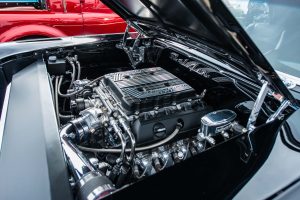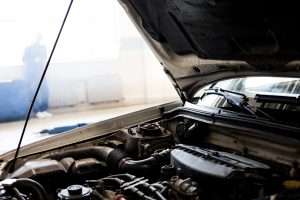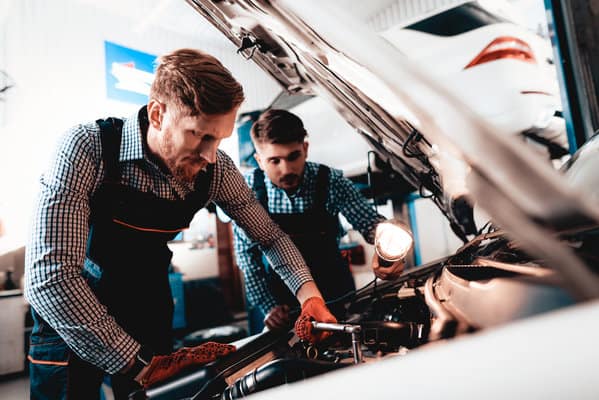As we focus on the Jeep 3.8 engine problems and possible solutions, you should keep in mind that no technological innovation we have today is without flaws.
This is why day after day, engineers and other technicians work endlessly to create better versions of what we have today.
The Jeep 3.8 engine is a dominant feature of the third-generation Jeep wranglers built between 2007-2011.
However, the particular brand of the engine did not come without some challenges, and some of them will be discussed below.
The 3.8L v6 engine was built at the Trenton Michigan assembly line and was first introduced in 1991 with comparable features to the 3.3L v6 engine.
However, the difference between the two is that the 3.8L V6 engine has more updates and is relatively bigger.
Like other engines, the 3.8 engine has seen more updates, from an engine found in minivans to one used in jeep wranglers in 2007.
However, many still question why Jeep decided to use the 3.8 engine instead of the 3.7L engines they’d been upstarting before then.
Features of Jeep 3.8 Engine
For starters, the Jeep 3.8 engine is manufactured by Chrysler. The engine’s head material is aluminum with cast iron as its block material.
The 3.8 engine has a 3.78in × 3.43in bore and stroke with a 60°V6 configuration. There is no definite horsepower estimate as it ranges between 200-215HP.
The 3.8 engine is susceptible to high temperatures, which is why it has multi-lair steel head gaskets, and the engine’s oil pumps are assembled into the timing cover.
Totaling 6 cylinders with two valves each, totaling 12, it is a naturally aspirated engine that can go on for about 200 thousand miles on average.
Major Problems of 3.8 Jeep Engine
With all the fantastic features of the 3.8, it should go without saying that it is also a bad side. These are some of the 3.8 Jeep engine problems a lot of people complain about:
- The engine breaks down after a couple of miles
- Uneconomic oil consumption
- Early morning engine knock sounds immediately after startup
- Engine oil leaks
- Noticeable rust around the engine
- Overheating is usually caused by cooling system failure
01. Engine Breakdown After a Couple of Miles

This problem usually occurs after about 100 thousand miles. After that, the engine develops problems and stops working as it should.
This has been a significant headache to the Jeep 3.8 engine users as some engines get damaged permanently and cannot be used again.
Unfortunately, this problem is inevitable; regardless, one can extend the number of miles the engine can run.
02. Uneconomic Oil Consumption
Unusual oil consumption is not a problem that affects new engines, and it may occur years after use.
For instance, the engine parts, e.g., the gaskets, might deteriorate and lose function over time.
You might, at that point, need to replace said engine parts. It can also be other faults in the engine, which the excessive consumption points to. They need to be traced as soon as noticed.
More often than not, when the engine begins to burn excess oil, you might be able to tell from the smell of burning oil or more smoke being released through the exhaust pipe of the Jeep.
03. Early Morning Engine Knock Sounds Immediately After the Startup
Many people have noticed that when they start up their engines early in the morning, there’s usually a knocking sound on startup.
This usually happens only when the car has been left overnight. During the day, the knocking sound isn’t there on startup, even after driving for a long time.
This might be worrying, especially to those who have no idea why the knocking sound is there.
04. Engine Oil Leaks
Oil leaks can result from a faulty valve cover gasket, oil pan, or blocked oil filters.
This may cause the engine oil to leak as you drive, making you spend more on oil unless the fault is repaired as soon as the leak is observed.
Sometimes, it could easily result from the excessive amount of engine oil carelessly poured into the engine.
05. Noticeable Rust Around The Engine
Many 3.8 engines are prone to rust as time passes. The rust may appear due to built-up water vapor, which mixes with oil or other chemical compounds and es the rust.
This occurs more during cold weather. The rust may also be a result of friction. The engine’s oil flow channels may get blocked by rust and lead to poor engine operation.
Engine rust is not a problem to be taken lightly as it can create other issues with the general Jeep system if not checked.
06. The Cooling System Failure Can Lead To Overheating
Overheating is a common problem with Jeep Wrangler engines. Among all the issues, overheating causes rather significant damage to the engine and other car parts.
When overheating, smoke may be seen coming from the car’s hood, usually before the temperature or ‘warning’ lights someone.
At this point, driving further would be very harmful to your car. Instead, slowly move off the road to let the car cool.
The overheating may be caused by a low quantity of engine coolant or a faulty radiator fan meant to balance car temperature. These faults affect the cooling system and lead to overheating.
The Solutions to Jeep Wrangler 3.8 Engine Problems

Fortunately for Jeep Wrangler users, some problems have easy and inexpensive fixes. Here are some solutions to the issues already discussed:
01. Carelessness can lead to engine failures. Therefore, you should inspect the engine parts regularly because you could never be careful with your car parts.
Make it a habit to check your engine parts before driving, especially before a long drive; you extend the limit of 100 thousand miles and use your engine for an extended period.
02. When you notice that your engine begins to consume more oil, you should immediately trace the source.
Adding more oil will not stop the engine from drinking up more oil. Instead, you should trace and fix the problem before adding more oil.
Also, ensure you’re using only the right type of oil as there are many fakes out there.
03. The cause of the knocking sound on startup you might hear early in the morning is usually because of a clogged-up or faulty oil filter.
To fix this, you must get only the right oil filter. For instance, many who purchased the Mopar oil filter have only good testimonies.
04. It is not difficult to see when the engine oil is leaking; when this begins, inspect the valve cover gasket to know if it is the source of the leak.
If it is, you should get it fixed as soon as possible to prevent further leakage.
You should also inspect to see if there are other sources of the leakage and if you can’t find any source, you should let an expert check it instead.
05. To prevent engine rust, you must primarily play your part to ensure the engine is in good condition, as already stated.
Engine rust might initially be unnoticeable, yet you should constantly check and apply anti-rust formulas on parts of the engine when you notice the rust.
Jeep 3.8 engines are prone to rust, so you should be ready to prevent it from even appearing.
06. Overheating is not a random occurrence; there are always underlying causes. You should check from time to time to see if you have sufficient engine coolant.
You should also constantly review your radiator fan and thermostat to ensure they work properly.
Finally, you should check for signs of a faulty water pump. When faulty, the pump may begin to leak or make some sound as you drive.
Benefits of 3.8 Engine
- The 3.8 Wrangler engine is designed to survive bumpy drives. As already stated, the Wrangler is sufficiently suited for off-road drives, including the engine
- With adequate care and maintenance, that baby can run for a while without much problem
- Easy fault repair, i.e., can mostly be easily repaired with the right knowledge and equipment if issues do arrive
- 8L engines are relatively easy to purchase and replace
The disadvantage of the 3.8 Engine
- Burns oil at an abundant rate
- Low life expectancy
- It cannot stand with some SUVs of its time in terms of speed, horsepower, and some other features
- Not suitable for constant long-hour drives
- A minor fault can escalate quickly and cause more damage if not checked
2009 Jeep Wrangler 3.8 Engine Problems
Here are also some 2009 Jeep Wrangler 3.8 engine problems:
- Low fuel mileage/economy, which means you might have to spend more on fuel than with other versions or brands
- The engine can sometimes break down and stop functioning. Regular maintenance and checks will prevent this from happening as with other versions
- Issues may arise with the transmission
- The 2009 Jeep Wrangler 3.8 engine can’t stand with some other 2009 brands in terms of constant/daily driving
- Sometimes, engine oil may leak from the gasket cover
- The ignition wires may sometimes not work, and this can lead to engine misfires
2010 Jeep Wrangler 3.8 Engine Problems
Here are also some problems the 2010 Jeep Wrangler 3.8 engines may face:
- The 2010 JK 3.8 engine has an equally low fuel mileage – an estimated 15/19 mpg
- High and uneconomical oil consumption rate
- The 2010 Jeep Wrangler 3.8 engine is not suitable for everyday driving
- The engine makes more noise than it should
- The 2010 Wrangler does not run very fast, so it is not so ideal for quick drives
- Mainly suited for off-road driving as opposed the highway or on-road driving
- It has a life expectancy of 100,000 miles which can go longer with delicate maintenance and care
Related Questions
Are There Other Cars That Use The 3.8L V6?
The answer is yes, and there are indeed other vehicles that use this engine. It wasn’t made explicitly for Jeep Wranglers.
For example, the Chrysler Minivans produced between 1994 and 2010 used the 3.8 engine and the 1991-1993 Chrysler Imperial models.
The Volkswagen Routan (2009-2010 models) was also made with 3.8L V6 engines.
Can I Depend on 3.8 Engines?
Yes, you can. The 3.8 engine has been around since 1991 and has had different upgrades and improvements since then.
Like other engines, the 3.8 has issues that have already been discussed. Regardless, it still performs entirely above average.
Will Getting a Jeep Wrangler Be a Bad Decision?
Jeep Wranglers are very versatile and practical. Despite their challenges, they remain some of Jeep’s best creations.
So no, it would not be a wrong decision, especially if you are interested in off-road or dirt path adventures. The Jeep Wranglers have got you covered.
What is The Life Expectancy of The 3.8L Engine?
The 3.8L can go as far as 100,000 miles on average. However, if you thoroughly maintain and pay attention to the engine parts, it can go as far as 150,000/200,000 miles.
There’s no definite figure; different 3.8L engine users might give varying answers when asked.
Which Jeep Wranglers Have Received The Most Complaints From Jeep Users?
While most Jeep Wranglers have similar issues, some models have more major defects than others.
The 2007 and 2008 models, for instance, were recalled several times as a result of steering and brake issues and other factors.
Final Thoughts
With or without all the problems the 3.8L V6 engine has, it is undoubtedly a significant improvement from the 3.3L model.
Moreover, it has remained quite effective, so it was used for so long to bring various cutting-edge cars to life.

Hello there, this is Thomas Byrd. I am a professional car mechanic who leads a team of junior mechanics in a repair and restoration shop. In the beginning, I used to work for a jeep service center as a basic worker. From there I keep learning, changed my job 2 times and now I am a professional who leads a group of mechanics. Though a have expertise in the jeep, I know very well about all types of cars. To share my knowledge and skills with others I have created this blog website. Whenever I get free time from work I give my time to my blog.
